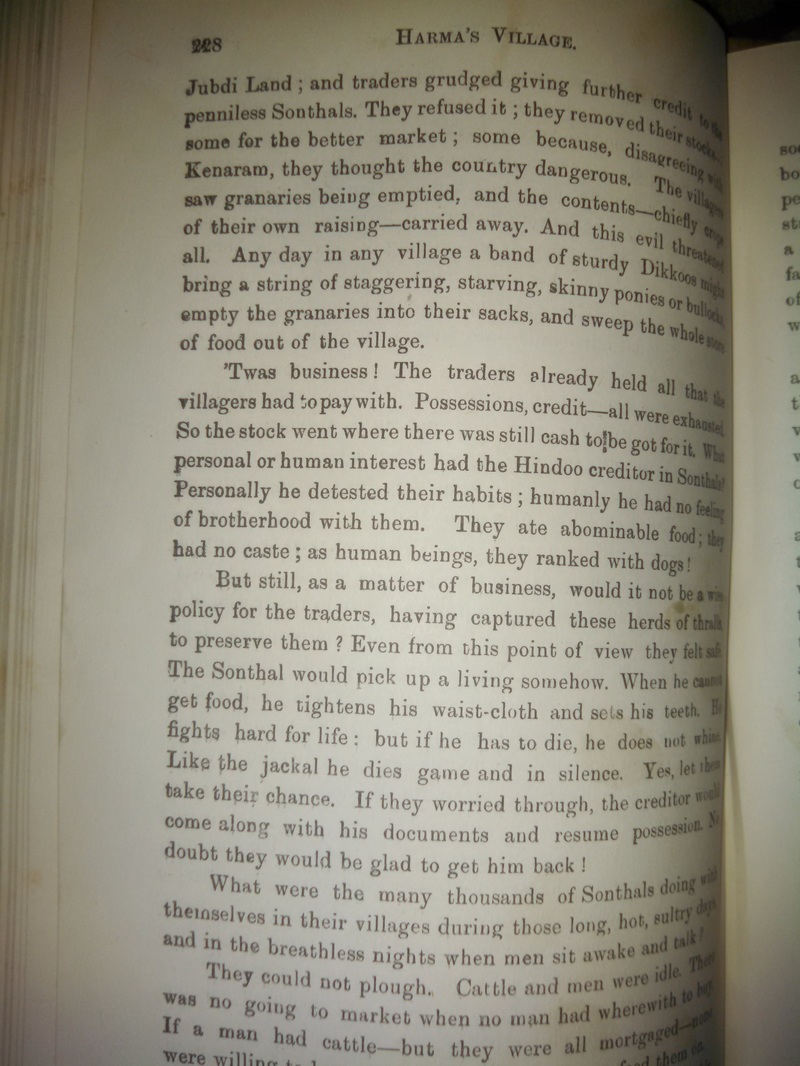New Years 1910 Purulia
Yea, though I walk through the valley of the shadow of death, I will fear no evil: for thou art with me; thy rod and thy staff they comfort me. Psalm 23:4

The buzzing of the sewing machine had put Doris in a trance. The pumping of her feet and guiding the cloth in line of the foot along the seams and hems had become such an automatic function that she didn't have to think about what she was doing. The soft chatter of her daughters in the adjacent room was fading into the background. Leible and Dora had been cutting pieces and now were hand sewing buttons on the two dresses that their mother had efficiently and lovingly completed. While they imagined together what life will be like at the Teacher College, Doris was being lulled into silent remembering of the past year.
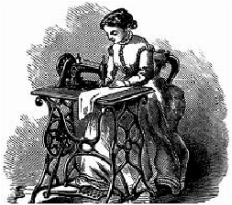
Her first thoughts emerged from fond memories of Christmas a year ago when she was glad for as much family together. This Christmas had been painfully small. While 12 living children were scattered around the world, Doris was always when those who were geographically near would all gather under the same roof: daughters, son-in-laws, grandchildren all together for a very happy Christmas in the large house in Purulia. Her daughter and Paul Wagner along with their sons, Siegried and Werner had settled into the red bungalow on the mission compound. Her dear friend and co worker, Marie lived in the small house at the lake.
The warmth of these memories quickly darkened as her memory focus in on the end of January 1909 when her dear husband became very ill with bronchial catarrh, a condition making for breathing because all narrow small airways were filled with phlegm. The consequential heavy cough was very aggressive and disturbing. She looked up from her sewing to check in on him seated back in his chair intently studying papers resting on his lap, appearing to be his typical robust self. He was fine for now. Just recovered as he had appeared back on in February 11 so that they could travel to Gumla, to get a change of air.
The warmth of these memories quickly darkened as her memory focus in on the end of January 1909 when her dear husband became very ill with bronchial catarrh, a condition making for breathing because all narrow small airways were filled with phlegm. The consequential heavy cough was very aggressive and disturbing. She looked up from her sewing to check in on him seated back in his chair intently studying papers resting on his lap, appearing to be his typical robust self. He was fine for now. Just recovered as he had appeared back on in February 11 so that they could travel to Gumla, to get a change of air.
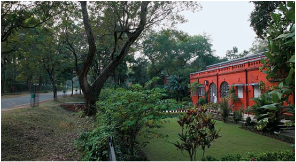
Ferdinand had been asked to cover for Brother Kasten who had to respond to a need elsewhere. Mrs. Kasten had asked Doris to take care of their household as well as their youngest daughter while saw her older child off on the ship back to Germany. Dutifully Doris took on this extra duty, despite the fact that she already felt overwhelmed by nursing her suffering husband. She recalled that first day in Gumla, February 15, Papa’s birthday, how purely terrible that day was because of the coughing attacks that were triggered by the hardship of the journey.
She recalled how all alone she felt at this new station. But had not the Lord been an ever present help in times of trouble. ready to provide strength to overcome fear and suffering. The quiet and cool lonely station provided the right conditions for her husband to regain his strength. Due to his new found strength, Ferdinand, embarked on a cordial visit with the Rajah of Jaspur in his capitol! It was always helpful to foster good relationships with the local rajahs. One would have a listening ear and perhaps a necessary supporter when the need arose. This Rajah was very interested in philosophy and religion. A visit would take most of the day with the two men talking and eating various delectable delights.
She recalled how all alone she felt at this new station. But had not the Lord been an ever present help in times of trouble. ready to provide strength to overcome fear and suffering. The quiet and cool lonely station provided the right conditions for her husband to regain his strength. Due to his new found strength, Ferdinand, embarked on a cordial visit with the Rajah of Jaspur in his capitol! It was always helpful to foster good relationships with the local rajahs. One would have a listening ear and perhaps a necessary supporter when the need arose. This Rajah was very interested in philosophy and religion. A visit would take most of the day with the two men talking and eating various delectable delights.
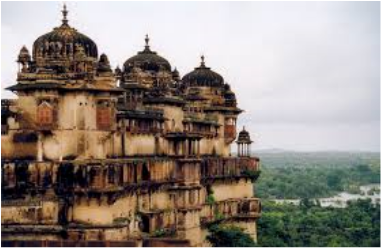
After a full month, they returned to Ranchi via Lohardaga (where Ferdinand and Doris had made their first home together as man and wife). Ranchi was where she felt most at home. Now even more so after a month of isolation she was surrounded by her dear missionary friends and co-workers who came from all parts of Chota Nagpur, and Chattisgarh, for the General Conference.
These gatherings were not only opportunity to be refreshed and encouraged by the fellowship of others, but also to witness her brilliant husband shine. This year in his usual vigor and eloquence his lecture addressed a subject near and dear to their hearts: the education of missionary children in India. She had been torn from her children for much of her sojourn in India, not seeing them for 10-12 years at a time while they received their education in Germany. Now her heart broke for her two married daughters, Louise and Maria, who worked in India but were separated each from their oldest child.
These gatherings were not only opportunity to be refreshed and encouraged by the fellowship of others, but also to witness her brilliant husband shine. This year in his usual vigor and eloquence his lecture addressed a subject near and dear to their hearts: the education of missionary children in India. She had been torn from her children for much of her sojourn in India, not seeing them for 10-12 years at a time while they received their education in Germany. Now her heart broke for her two married daughters, Louise and Maria, who worked in India but were separated each from their oldest child.
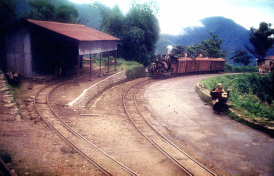
Another dress was completed and she picked up the fourth to labor over on this final day of 1909. As the steady rhythm of the sewing resumed, she lapsed back into remembering the year gone by.
Her heart sank further as she remembered her delicate daughter, Mariechen. Doris new well the great weight of sorrow that overwhelms a mother who loses a child, having lost 3 of her own. Marie had lost Inge in 1908 which had taken away too much of Marie's life’s strength. Her weak body did not have enough resistance. They had hoped that her spirits and health would revive due to another hopeful pregnancy. But hopes were dashed when she miscarried I April. Over time it was learned that she had a severe disease. Rapidly they watch her health decline, an increased hard cough, un measurable misery. But truly unaware of the severity of her condition they set their faith that all was in the hands of the Great Physician to mend both her heart and body.
With mild concern for her daughter and greater concern for her husband, they traveled quite calmly to Darjeeling, in early May. To reach Darjeeling was an ever increasing journey into joy as the temperatures dropped and eased up the Himalayan heights by what was called a "toy train" to enter a community of fellow Western escapees from the ruthless heat of the India plane as it waits for the relief of the monsoons.
Her heart sank further as she remembered her delicate daughter, Mariechen. Doris new well the great weight of sorrow that overwhelms a mother who loses a child, having lost 3 of her own. Marie had lost Inge in 1908 which had taken away too much of Marie's life’s strength. Her weak body did not have enough resistance. They had hoped that her spirits and health would revive due to another hopeful pregnancy. But hopes were dashed when she miscarried I April. Over time it was learned that she had a severe disease. Rapidly they watch her health decline, an increased hard cough, un measurable misery. But truly unaware of the severity of her condition they set their faith that all was in the hands of the Great Physician to mend both her heart and body.
With mild concern for her daughter and greater concern for her husband, they traveled quite calmly to Darjeeling, in early May. To reach Darjeeling was an ever increasing journey into joy as the temperatures dropped and eased up the Himalayan heights by what was called a "toy train" to enter a community of fellow Western escapees from the ruthless heat of the India plane as it waits for the relief of the monsoons.
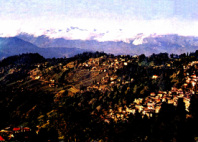
Arrangements had been made for them to stay at Miss MacIntosh’s Clover Cot, for two months, a very nice time of recreation there. Doris writes the following about their stay in Darjeeling:
"On May 16, Papa gave away to the dear Breklum friends that it was my birthday. How they
surprised me early in the morning with a two-part song in front of our bedroom window:
“Praise the Lord” and “Brich herein” and “so then take my hands”. Oh, it was wonderful! Papa
had then invited them for afternoon tea and cake, which our hostess served. That was to be his
birthday gift. And it was a very nice coffee party, which I shall never forget. Dore had not been
able to come from Queens Hill, was on duty. But Libele celebrated with us. She had made good
friends with the Breklum ladies, made wide trips on foot with them, which was too exhausting for
Papa and myself, once even via Ghoom to Santchel (later called Tiger Hill) in order to see
Mt. Everest, which did not give her that pleasure, but was hiding in deep rain Papa and I did not
dare go too far; we visited prayer meetings and services and took walks in Darjeeling, enjoyed
hearing the band and made new acquaintances, such as Missionary Albrecht of Guntur Mission,
Mr.Göttsching from Leipzig Mission, etc. Once Papa even preached in Union Chapel in English
on the word: “Whoever is thirsty, come to me and drink.” Oh, how different
from the American missionaries, even from Dr. Parker who is temporary
preacher at Union Chapel, whose talks are full of illustrations and stories,
but are missing the warmth and effectiveness, which our father knew to give
to every speech. Brother Göttshing later thanked him from his heart and said to me:
"Now that was a sermon!"
"On May 16, Papa gave away to the dear Breklum friends that it was my birthday. How they
surprised me early in the morning with a two-part song in front of our bedroom window:
“Praise the Lord” and “Brich herein” and “so then take my hands”. Oh, it was wonderful! Papa
had then invited them for afternoon tea and cake, which our hostess served. That was to be his
birthday gift. And it was a very nice coffee party, which I shall never forget. Dore had not been
able to come from Queens Hill, was on duty. But Libele celebrated with us. She had made good
friends with the Breklum ladies, made wide trips on foot with them, which was too exhausting for
Papa and myself, once even via Ghoom to Santchel (later called Tiger Hill) in order to see
Mt. Everest, which did not give her that pleasure, but was hiding in deep rain Papa and I did not
dare go too far; we visited prayer meetings and services and took walks in Darjeeling, enjoyed
hearing the band and made new acquaintances, such as Missionary Albrecht of Guntur Mission,
Mr.Göttsching from Leipzig Mission, etc. Once Papa even preached in Union Chapel in English
on the word: “Whoever is thirsty, come to me and drink.” Oh, how different
from the American missionaries, even from Dr. Parker who is temporary
preacher at Union Chapel, whose talks are full of illustrations and stories,
but are missing the warmth and effectiveness, which our father knew to give
to every speech. Brother Göttshing later thanked him from his heart and said to me:
"Now that was a sermon!"
Paul, Doris' faithful son-in-law, sent a wire the end of May to let them know that the physician in Purulia had declared that Mariechen’s lungs were affected with TB. They still did not completely understand the severity of her illness until returning to Purulia in July and witnessed her breakdown, her deep suffering, and also that something radical had to be done for her health.
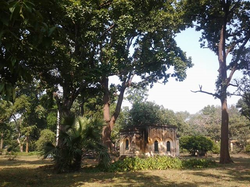 Ruins of the church in Purulia
Ruins of the church in Purulia
It was decided that the big house was higher elevation and better ventilated. So the Wagners moved into the big house and Ferdinand and Dora moved into the so-called Police Bungalow (used by the British only when a strong police presence in the region was necessary, such as back in 1890. Typically the Bungalow was left empty. The large house was closer to the church and more suited to Paul's work which was now to manage both the school and church. Ferdinand had given up congregational work and wanted to concentrate on his role as Secretarial and Asylum work. Doris found this new arrangement under the glorious pipal trees pleasant and homey, referring to her new accommodations as "our dear senior home”.
Today back in the big hourse full of fond family memories. Doris now moved to her last project of sewing each daughter an all purpose skirt. She paused to look around to find everyone absorbed in their thoughts and so resumed her reminiscing. By the end of the rainy season the adjustments to make life easier for the Wagners proved fruitless. The only real hope for her was to go to a sanitarium in Almora, in the lower hills of the Himalayas. Here she remained with her two children while Paul worked alone in Purulia, visiting her on occasion.
During the rainy season in 1909 father had to suffer much with boils and infected fingers which sister Marie (their faithful co-worker) bandaged. Ferdinand used to joke then: “The hut begins to rot, we mend it here and there until it breaks apart altogether.” And at other occasions, he loved to talk about going home and eternity. Especially during our Bible studies on Tuesday evening when he taught the Gospel of John, it became apparent how ready he was to be called by his Master, any time. Still nothing kept him from his work. Tirelessly he sat at his desk to do administrative and linguistic. He used to spend an hour in the evenings or perhaps early morning to beautify the compound, lay out paths and hedges, etc. Englishmen who came to visit were surprised about the positive change of the place.
Today back in the big hourse full of fond family memories. Doris now moved to her last project of sewing each daughter an all purpose skirt. She paused to look around to find everyone absorbed in their thoughts and so resumed her reminiscing. By the end of the rainy season the adjustments to make life easier for the Wagners proved fruitless. The only real hope for her was to go to a sanitarium in Almora, in the lower hills of the Himalayas. Here she remained with her two children while Paul worked alone in Purulia, visiting her on occasion.
During the rainy season in 1909 father had to suffer much with boils and infected fingers which sister Marie (their faithful co-worker) bandaged. Ferdinand used to joke then: “The hut begins to rot, we mend it here and there until it breaks apart altogether.” And at other occasions, he loved to talk about going home and eternity. Especially during our Bible studies on Tuesday evening when he taught the Gospel of John, it became apparent how ready he was to be called by his Master, any time. Still nothing kept him from his work. Tirelessly he sat at his desk to do administrative and linguistic. He used to spend an hour in the evenings or perhaps early morning to beautify the compound, lay out paths and hedges, etc. Englishmen who came to visit were surprised about the positive change of the place.
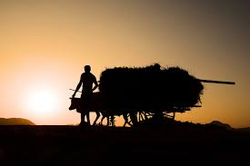
As she glanced up from her work, Ferdinand had entered the room to speak with the family of his next big project. She was nearly done with all her sewing for the night. And the girls circled around their father, loving any opportunity for him to tell his tales. He told of how severe the famine had become and the arrangements he had made with the Mennonite mission to get three train cars of grain and be responsible for distribution throughout the northern region of Chota Nagpur. He described how the new rail road into the region would make this possible to get the grain to major cities and then load up ox carts to deliver to more remote areas. He would be would set out on a journey to Palamo via Gaya, Daltonganj, etc after the new year (1910). It was important for him to be in full form to manage the distribution to be able to report back on the impact of the famine to the General Conference in April.
Sun was setting, so as the others talked amongst themselves, Doris cleaned up around her. She noted that the dinner was nearly ready to be served by their servants. The small family spoke excitedly anticipating what the new year would hold. They knew that it would be full of joys, and adventures (such as going to a new school) and would also include unforeseen difficulties. Little did they know that they would be saying one final farewell to their dear father in a matter of months. For now on this new years eve they were filled with gratitude of how their Lord had seen them through all kinds of illness and hardship. Their hope was set on the one that had seen them through before and would see them through again.
Sun was setting, so as the others talked amongst themselves, Doris cleaned up around her. She noted that the dinner was nearly ready to be served by their servants. The small family spoke excitedly anticipating what the new year would hold. They knew that it would be full of joys, and adventures (such as going to a new school) and would also include unforeseen difficulties. Little did they know that they would be saying one final farewell to their dear father in a matter of months. For now on this new years eve they were filled with gratitude of how their Lord had seen them through all kinds of illness and hardship. Their hope was set on the one that had seen them through before and would see them through again.
Note: this story is based completely on Doris' journal. It is basically an edited version of her story often in her own words with some minor embellishments.
